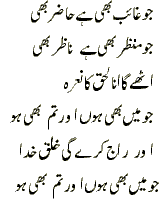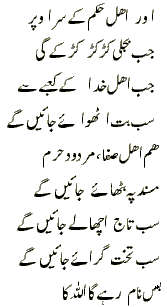 Adil Najam
Adil Najam
The very first blogpost on ATP was the video tribute to Pakistan I had made using Faiz Ahmed Faiz’s classic poem ‘hum daikhain gay...’ This was not just blatant self-projection — although it was that too. It was an expression of my hopes and concerns, an acknowledgement of my gratitude to Faiz’s poetry, and in many ways a ‘statement of purpose’ for this blog.
 A number of people have asked me to post an English translation of the poem ‘hum daikhain gay...’ There are, of course, many available translations of this classic work. But I wanted to share a new one with you. This is by Maniza Naqvi and I find this particularly powerful because it is simple and true to the original words and yet is able to also convey the intensity of poem’s intent. Translating poetry is never easy. Here is a good example of how it should be done.
A number of people have asked me to post an English translation of the poem ‘hum daikhain gay...’ There are, of course, many available translations of this classic work. But I wanted to share a new one with you. This is by Maniza Naqvi and I find this particularly powerful because it is simple and true to the original words and yet is able to also convey the intensity of poem’s intent. Translating poetry is never easy. Here is a good example of how it should be done.



We shall see/certainly we, too, will see/
that day that has been promised us
When these high mountains
Of tyranny and oppression/ turn to fluff
And evaporate
And we oppressed
Beneath our feet will have
this earth shiver, shake and beat
And heads of rulers will be struck
With crackling lightening and
thunders roar.
When from this God’s earth’s (Kaa’ba)
All falseness (icons) will be removed
Then we, of clean hearts–condemned by zealots those keepers of faith,
We, will be invited to that altar to sit and Govern–
When crowns will be thrown off–and over turned will be thrones
We shall see/certainly we, too, will see
that day that has been promised us
Then God’s name will remain (Allah will remain)
Who is invisible and visible too
Who is the seer and and is seen
Then will rise one cheer———I am God!
Who I am too
And so are you
Then the masses (Khalq e Kuda) people of God will rule.
Who I am too
and so are you
Then will rise one cheer———I am God!
Who I am too
And so are you
(Translation by Maniza Naqvi)
 You will find much written on Maniza on the web–for example, here, here and here. She works at the World Bank, lives in Washington, DC, and is an active intellectual whose works include (apart from others) ‘Mass Transit‘ (a novel based in Karachi about the emotional consequences of mass migration and “an immigrant population which never really assimilates”) and ‘On Air‘ (another novel where the plot unfolds over a six-hour period in which the main character,
You will find much written on Maniza on the web–for example, here, here and here. She works at the World Bank, lives in Washington, DC, and is an active intellectual whose works include (apart from others) ‘Mass Transit‘ (a novel based in Karachi about the emotional consequences of mass migration and “an immigrant population which never really assimilates”) and ‘On Air‘ (another novel where the plot unfolds over a six-hour period in which the main character,  Naz, tells stories to listeners and callers over the radio on a late night talk show slot that she has been offered to fill for just one night).
Naz, tells stories to listeners and callers over the radio on a late night talk show slot that she has been offered to fill for just one night).
In reviewing ‘On Air’, Asif Farrukhi, writes:
Post-nuclear Pakistan is a medley of voices–the enigmatic female host of a phone-in talk show discovers as opinions abound, pizza, hijab, recipes which are a part of culture and not sectarianism, come together in a compelling narrative… A welcome addition to the stunted list of Pakistan’s writers in English, Maniza Naqvi is a name to look out for.



















































This song is timeless and transnational. It’s so damn inspiring!
Adnan, don’t give up on faraz that easily. in today’s newspaper he is returning honors given to him by govt:
http://www.thenews.com.pk/top_story_detail.asp?Id= 2130
ISLAMABAD: Noted poet Ahmad Faraz has returned a prestigious award conferred on him by the government, in response to what he called “denial of basic rights to the people of Pakistan and shedding of their blood”. In a letter issued to the media on Saturday, Faraz expressed grave disappointment over the current state of affairs, holding the government of President Pervez Musharraf squarely responsible.
He said: “The government of Pakistan awarded me Hilal-i-Imtiaz (civil) in the field of literature for the year 2004. The conferment of an award like the Hilal-i-Imtiaz is a great honour for any man of letter has always deemed it as such.
“However, I have also been concerned that this honour had been shown to me by regime that had denied the people their basic democratic rights. In accepting the award I had hoped that as promised the democratic rights of people would soon be restored,” Faraz observed.
Dont you guys think we really miss FAIZ like poet now and we really neeed him?
Why ahmed Faraz compromised with situation.Its really filthy feeling for me.:(
That really is one of the best translations I have seen of a piece of Urdu poetry.
Asma
I don’t think there is any anger in Faiz. There is resolve. There is determnation. And there is hope. I think the magic of Faiz is his hope. Despite everything that happened to him and to the nation, he never gives up hope. There is always the promise of the better tomorrow…. ‘Hum daikhain gay’
By the way, that is what I like best about Prof. Najam’s video on this poem. Despite the fact that for most of it one sees depressing images, at the end one come out with hope, not despair.